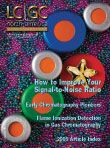Peaks of Interest
Varian acquires Polymer Labs, Thermo contributes to Hurricane Katrina Disaster Relief Fund, and French Police select Whatman for DNA collection.
Varian acquires Polymer Labs
Varian, Inc. (Palo Alto, California) recently announced that it has acquired PL International, Ltd. (Shropshire, United Kingdom), and its subsidiaries including Polymer Laboratories, Ltd. (Amherst, Massachusetts) for approximately $42 million in cash. The transaction includes an opportunity for up to $23 million of additional payments over three years, depending upon financial performance.
Polymer Laboratories develops of consumables and instrumentation for advanced polymer analysis, including columns, standards, and specialist chromatography systems dedicated to gel permeation chromatography analysis.

Laboratory Information Management Systems
"The acquisition of Polymer Laboratories is strategic to the advancement of Varian's goal to grow the applications-based consumable products to become a larger portion of the business," said Garry W. Rogerson, president and CEO of Varian.
The acquisition is part of the company's strategy to strengthen its product portfolio with internal research and development efforts and strategic acquisitions of complementary products and technologies.
Thermo contributes to Hurricane Katrina Disaster Relief Fund
Thermo Electron (Waltham, Massachusetts) recently has announced that it will match employee contributions to the Red Cross in support of the Hurricane Katrina Relief Fund. During the days following the disaster, the company's employees contributed money, food, water, medicines, and other relief to help the evacuees and those remaining in the affected areas.
French Police select Whatman for DNA collection
Whatman (Florham Park, New Jersey) recently announced that the French Police and French Gendarmerie Nationale have chosen the company's Indicating FTA Cards for the collection and transportation of buccal cell samples for forensic investigations. This agreement extends the relationship that began in 2000, when France first implemented a comprehensive database for the storage of criminal DNA.
"When our samples are collected and sent to our laboratories for processing, we need to be completely confident that the samples will maintain their integrity throughout the transportation process," said Captain Frederic Brard, head of the High Throughput Laboratory of the Gendarmerie Nationale. "After evaluating several products for DNA collection and analysis, it was clear that our original choice, Whatman FTA, is still the most reliable product available."
A Novel LC–QTOF-MS DIA Method for Pesticide Quantification and Screening in Agricultural Waters
May 8th 2025Scientists from the University of Santiago de Compostela developed a liquid chromatography quadrupole time-of-flight mass spectrometry (LC–QTOF-MS) operated in data-independent acquisition (DIA) mode for pesticide quantification in agriculturally impacted waters.
Investigating 3D-Printable Stationary Phases in Liquid Chromatography
May 7th 20253D printing technology has potential in chromatography, but a major challenge is developing materials with both high porosity and robust mechanical properties. Recently, scientists compared the separation performances of eight different 3D printable stationary phases.

.png&w=3840&q=75)

.png&w=3840&q=75)



.png&w=3840&q=75)



.png&w=3840&q=75)










